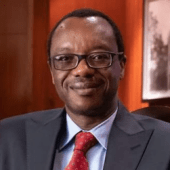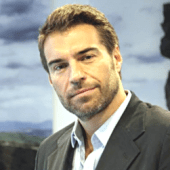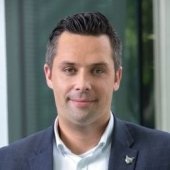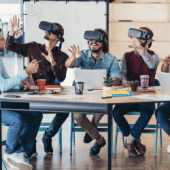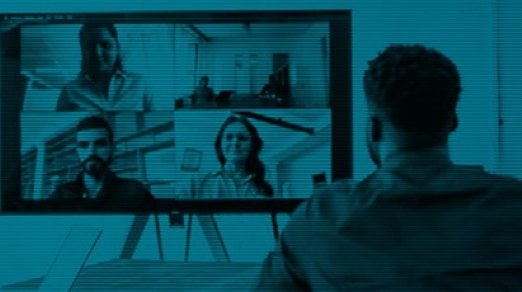View from Down Under: NSW’s Chief Data Scientist on technology and the future of work
IN BRIEF
- 4:05 - Increasingly, we are not just connecting with people, we’re also connecting with devices, and devices are connecting with devices. Those futuristic ideas of the Internet of things suddenly become much more significant, much more important.
- 10:58 - AI will play an increasingly important role. The good thing is we’re still a long way from that point of singularity where AI is much, much smarter than human beings, but AI is increasingly good at doing mundane, repeatable tasks, but it’s moving up the value-creation stacks.
- 17:42 - The issues we’ll be looking at in the world of 2050 will be very different issues: changing climate, aging, an urbanizing population. The issues, then, are going to be issues about inequality because the world has different access to resources, different access to medicines, different access to education. What we all need to get better at is thinking about a global community.
Ghislaine Entwisle, a Managing Director at Protiviti Australia and co-leader of the IT Advisory practice sits down with Dr. Ian Oppermann, the New South Wales Government’s chief data scientist working within the Department of Customer Service. Oppermann is also an industry professor at the University of Technology Sydney and served as CEO of the New South Wales Data Analytics Centre from 2015 to 2019 and is considered one of Australia’s leading thinkers on the digital economy and big data and an expert on the future impact of technology on society.
VIEW FROM DOWN UNDER: NSW’S CHIEF DATA SCIENTIST ON TECHNOLOGY AND THE FUTURE OF WORK - Video transcript
Joe Kornik: Welcome to the VISION by Protiviti interview. I’m Joe Kornik, Editor-in-Chief of VISION by Protiviti, our content initiative where we look into the future and examine the strategic implications of big topics that will impact business, the C-suite and executive boardrooms worldwide over the next decade and beyond.
Today, we’re exploring the future of work and all its implications for employees and employers, as well as clients and customers. We’ve got an outstanding guest today as we welcome Dr. Ian Oppermann, the New South Wales Government’s chief data scientist working within the Department of Customer Service. Dr. Oppermann is also an industry professor at the University of Technology Sydney and served as CEO of the New South Wales Data Analytics Centre from 2015 to 2019. He is considered a thought leader on the digital economy and big data and an expert on the future impact of technology on society. Dr. Oppermann will be interviewed by my colleague Ghislaine Entwisle, a managing director at Protiviti Australia and co-leader of the IT Advisory practice. I’m looking forward to an enlightening discussion, so I’ll turn it over to Ghislaine to begin.
Ghislaine Entwisle: Thanks, Joe. Great to be here, and it’s so lovely to be joined today by Dr. Ian Oppermann. Welcome, Ian.
Ian Opperman: Thanks, Ghislaine. Great to be here.
Entwisle: Ian, the global pandemic has had such a material impact on the way we work. What do you think are the biggest takeaways from the pandemic, and what will be its legacy in terms of how it impacted how, where and when we work?
Opperman: Thanks, Ghislaine. That is the question of the hour. COVID-19 has really changed, or accelerated, so many things that we were doing, at least from a tech perspective. It’s had an incredible impact on the entire globe. It taught us about the value of inequality. It taught us about the value of thinking and acting globally. But from a tech perspective, what it did was accelerate telework, telehealth and tele-education. The conversation we’re having right now is one that we might have had under normal circumstances, but it’s something which has just become normal. Each and every one of us now has a little home studio, and sometimes there are screaming kids in the background, sometimes there are dogs and cats up on the screen, but this is normal. Work environment is one thing, but the implications for things like telehealth and tele-education, I think we’re actually much more profound.
Australia has a real challenge with the tyranny of distance. We know that health outcomes in regional and remote Australia are very different to urban environments. I’m hoping that the greater acceptance of telehealth, in particular, will have very substantial impact on a whole range of life outcomes. Tele-education, I hope will also have some substantial impacts on educational outcomes.
Entwisle: You mentioned technologies being a cornerstone to this. It has been so crucial to working through this pandemic, and it will perhaps be even more important in the future. In your view, how will technology continue to influence the future of work both in the near term and the far term? Do you have any local examples that you can provide on this?
Opperman: That’s another great question. Pre-COVID-19, we spent a little bit of time thinking about what the future would look like, and the big issues were being able to handle data in an appropriate way of getting our governance right, being able to increasingly be comfortable with increasing use of increasing amounts of data. Fast-forward with COVID-19, what we’ve seen, of course, is that all of those long-term trends still remain, but the need to get serious about cybersecurity where everybody suddenly is a node in a network, as opposed to people working in a normal office environment where normal security and governance can be applied. Everybody is that — our own little home office now. Being serious about cybersecurity, being serious about making sure that we are connected in an appropriate way, it’s not so subtle, but it’s a reasonably important shift to the way we think about decentralized engagement.
The longer-term consequences are that increasingly, we are not just connecting with people, we’re also connecting with devices, and devices are connecting with devices. Those futuristic ideas of the Internet of things suddenly become much more significant, much more important.
Rather than you and I talking to each other via a video system, many distributed devices are talking to each other in environments which, again, are not as well controlled as if it was a centralized office environment or a centralized network. That broad distribution of many devices operating in a relatively insecure way, where any particular device could be compromised deliberately or due to some sort of failure, is the thinking we need to bring to future very complex systems where we are forced to rely on inherently unreliable systems potentially creating vulnerabilities, but requiring us to think differently about how we deal with very complex, very distributed systems.
Entwisle: Your point around it being so much more of a complicated technology landscape than we’ve had before does mean that organizations and people have to be a lot more switched on around all those potential vulnerabilities and risks that they previously haven’t experienced, or certainly have not experienced as intensely as they have in the examples that you provided. Specifically, around the technologies, what specific technology do you think will have the greatest impact on the future of work over the course of the next decade?
Opperman: There is some big tech looming on the horizon. Quantum, I think, is one of the really most important ones. As we increasingly move towards viable quantum computing, there are a couple of fundamental issues we have to address. Security, as we know it, suddenly gets a very great challenge simply because we’re relying on hard puzzles being solved by linear computing devices. A quantum computer can do things very differently.
We also, of course, are thinking about technologies, again, where everything is connected to everything else. I spend some of my time working with the world of 6G — trying to bring 6G to life. The idea of not billions of devices but hundreds of billions of devices being connected, again, means you need to think very differently about not just issues of complexity and cybersecurity but also issues around energy consumption.
At the moment, it’s estimated that something like 2% of the world’s energy is being consumed by data centers. If you replace data centers with an incredibly distributed data storage, data-connection type of devices, plus everything being able to communicate with everything else, and data analytics and AI being thrown in on top of all of that, the percentage of the global energy budget we consume with data analytics, AI and moving data suddenly has the potential to skyrocket. Thinking about energy consumption in data analytics is a very important aspect of how we think about the future.
Entwisle: As data, there’s more and more of it every single day. It’s going to continue to be a very big thing that we need to worry about. You’re right. The energy impact is something that we should be more aware of — the impact on how we can manage that and mitigate some of that as well. Thinking about it from the future of work, from an employee engagement and customer experience perspective, how do you think that might change in the future?
Opperman: That’s interesting. Our idea of that total customer experience in general is something which is based on the historical model of slowly but surely building up an engagement between people. Again, if what we’re doing right now is the new normal, that 2D projection of an engagement is something which we’re getting better at. At the very best, you could say it’s a 2.5D engagement, as opposed to a real human interaction — being able to accept this as a reasonable way of engaging, just as we accepted the telephone as a 1D engagement. It was OK, it was normal and that’s what we expected.
If we are trying to replicate an in-person engagement between people, between people and customers, between coworkers, between a doctor and a patient, or between a teacher and a student, there’s a lot more that we need to bring to bear or we need to change our expectations. We’ve all accepted that COVID-19 means we need to do this, so we will engage this way. The challenge has always been that during COVID-19, we can’t build teams — we can’t form, we can’t norm, we can’t storm. We’ve got along as best we can. If that was really the long-term future, then it has all sorts of great implications for where teams can form, but it has got implications for the human interaction.
There’s another interesting part to that. I spend a lot of my time working with international standards, and that’s by definition global. We’re trying to use three different time zones to ensure that we are as inclusive as possible, but the reality is, there are a lot more European-centric or North American–centric time zones than those which are favorable for people in Asia-Pacific.
If we are to work like this in the future, we need to think more about diversity and inclusion, and that means geographic inclusion and time zone inclusion. I would never have thought we’d be talking about time zone inclusion as a real issue, but the midnight–to–3 a.m. calls, and falling asleep during a meeting, which is something which would be outrageous two years ago — you start to hear people get quieter and quieter as the meeting progresses, and you think at some point, “I’ve probably lost my colleague.” Again, that’s something which we hadn’t really considered as a real issue. We are prepared to make allowances during COVID-19, but we have to get that right if we’re going to operate in a genuine distributed tele-world.
Entwisle: There’s a difference between allowing it for a short-term period during the pandemic, but then going back to it afterwards, you’re right, this is something that we’re looking to build into the way in which we operate in the future, in the future of work. We do really need to think about what that looks like and what that means for our customers and our employees as well. Interesting insights there.
What will organizations need to be aware of in shaping their workforce of the future? I’m interested in your perspective on what role artificial intelligence would play. Also, a bit about how that might impact the diversity of the workforce in 2030.
Opperman: I was thinking about that when giving the last answer, because AI will play an increasingly important role. The good thing is, we’re still a long way from that point of singularity where AI is much, much smarter than human beings, but AI is increasingly good at doing mundane, repeatable tasks but moving up the value-creation stacks, so it’s not just doing something again and again and again. Things like e-discovery have shown that there are some aspects which we used to think were relevant to people that can be done by devices. One of the important dimensions of this opportunity is that as AI becomes more generalized — and again, there’s a long way from that point of singularity — it’s the creativity of people, it’s the diversity of thought, it’s the inclusiveness of people with different perspectives that will really be competitive differentiators.
In my robust discussions with the standards community about the need to have rotating time zones and allow everybody to be included, I say that if we don’t have diversity, we run the risk of having this relatively small group of people think through a particular approach to a challenging problem. And it will be not just a nice-to-have, but diversity will start to become a genuine competitive advantage when things which are not that creative or are increasingly more repetitive start to be able to be done through AI. Diversity will be one of the really interesting opportunities for all people in the workplace. As increasingly mundane tasks get automated away, diversity will be a competitive differentiator, and I hope companies start to see that and start to compete for diversity in the workforce.
Entwisle: That would be a wonderful outcome. To your point earlier, around the time zone inclusion and other components that do mean some parts of the world are less well represented, the quality of any of our solutions that we develop is tailored to a small minority, and that’s not what we want. We get the power of innovation through leveraging the diversity of what the globe has to offer. I love that insight, Ian. If we look now from the perspective of education, training, leadership development, talent management and career pathways, how will that change in the future?
Opperman: There’s a lot to what you just said. One of the things that we saw pre-COVID-19 was the advent of massive online training — the MOOCs. What it meant was that someone in Sydney could reach out to many tens of millions of people in China or North America. I have a colleague from the University of Technology who’s done exactly that — really popular online courses on AI. Again, that takes us a step forward in terms of our ability to be able to expand and scale the influence of an individual — but again, that’s not all of it.
That point about developing an integrated, diverse and inclusive perspective on a whole range of different problems that people tackle will remain the challenge. Telecommunications and scaling and recording and the use of ICT allow us to project one to many. It still doesn’t address the many-to-many or the many-to-one — that challenge still remains. There are some uniquely human aspects to all sorts of team or workforce or educational developments where people are still the unique elements in the network. We don’t scale very well, in particular, when we’re many to one, and yet it’s that genuine human interaction with teams, that forming and norming, which really allows for the storming, which we haven’t quite got right.
There are still some important scaling issues we need to think about, and there are some important elements of going beyond 3D. If phone is 1D, what we’re doing now is 2D. If, perhaps, other sorts of integrated media give us 3D, that’s still not quite it. As a species, we have always done well when different people come together and exchange ideas in a meaningful way and build trust and build relationships and then work together.
A casual interaction may allow you to exchange an idea, but to really move forward as a high-performing team, you do need to have those human interactions where you long-term trust the people you’re working with, are long-term are willing to bring your full self into that engagement. If I had never met you before, Ghislaine, I’d be enjoying this conversation, but I know who you are, I trust you and I’d be very happy to collaborate in this form for some time. But if we’d never had that initial building stage, it would be difficult.
Entwisle: As you say, that then makes your education or training experience far less rich, and so you’re not getting the innovation, the creation, the great outcome of rich interactions, and so, as you say, there’s a way to go to, to lift that, to enable us to have those rich experiences. What type of tools and techniques will organizations need to be proficient in to grow at the pace we expect change to move?
Opperman: There are some fundamentals. There are things that we’re using right now — the ability to have secure, reliable, appropriate and quality communications, which is very important, the ability to have distributed security in systems like this, which is very important. Then, beyond that, the knowledge management and exchange are going to be very important. Again, at the risk of harping on about some of the issues I’ve already raised, the ability to find ways to collaborate, there have been a few really interesting tools that we’ve tried online. Online whiteboarding is not quite the same as holding a pen and standing there and sparking up each other. There are some tools around sidebar conversations, and we’ve got breakout rooms and such things. Again, they’re a good step, but they’re not quite all the way there.
But if we project forward to, say, 2050 and the sort of challenges we’re looking at there, I hope we’ll have data and security — well, maybe not security, but at least we’ll have data and governance issues sorted out. It’s fingers crossed on that one. The issues we’ll be looking at in the world of 2050 will be very different issues: changing climate, aging, an urbanizing population — very different world in terms of where we live and the intensity with which we’re living in that world.
The issues, then, are going to be issues about inequality, and issues around things like a global pandemic — which will keep coming back to bite us in waves, because the world has different access to resources, different access to medicines, different access to education and different perspectives — are the sorts of challenges we need to think hard about how we globalize these local pockets of connectivity, pockets of creativity and pockets of interaction. What we all need to get better at is thinking about a global community, thinking about the inequalities which will inevitably arise because we all live somewhere, we all interact with the real world in some way, and thinking about what we could do with the digital world which will allow us to increasingly address some of those real physical geographic inequalities.
Entwisle: That’s a great challenge to everyone listening today: How can we influence that in a positive way so there is less inequality in the world, there’s more opportunity to connect equally. We were touching a little bit there around global perspectives. I was keen to get your thoughts around, how can government and industry bodies influence global standards and policies to perhaps either enable a faster pace of innovation or just connect more?
Opperman: One of the things that COVID-19 has shown us is that this is a global problem. If we’re not all equally vaccinated or have access to vaccines, if we’re not all equally aware and understand the challenges, then we will find that that inequality allows COVID-19 to do its next trick and come back and impact the world, and then another pocket of inequality allows COVID-19 to do its next trick and so on. As a consequence, we have this dance with COVID-19 which will potentially go on much longer than if we all have equal access. One of the things governments can do is, first, agree with each other that there are a minimum set of standards with the smallest around the access to different resources, a minimum set of standards around understanding that if we don’t have the access to resources, we don’t access to the tech, we will start to create a multispeed global economy or multispeed global community.
We’ve talked about third-world and we’ve talked about first-world and sometimes second-world. That labeling of the different environments people are in is great if you’re a 19th-century economist or a 20th-century economist. It’s not going to work for the 22nd century. If we think about the fact that differences drive the opportunity for catastrophic outcomes, either through mass migration or through people looking for a better life — physically leaving the environment they’re in because they don’t have access to those resources — or the opportunity for viruses to essentially have an environment where they can propagate and reproduce and evolve, those massive inequalities have the potential to constantly bite the first world and the second world.
So governments are acknowledging that in many respects, we don’t have a choice but to think globally, and we should operate with the global mentality. That’s important. Things like COP26 — a great opportunity for the world to come together and say, “Climate change is real. There are some minimum things we need to do.” That’s really important. Local politics drives local decision-making, and as a consequence, we have to be able to, to some extent, acknowledge that whilst we might want to do things locally, we always have to have an eye on the global environment.
Entwisle: As you say, thinking globally is going to be more and more important in the future, so we can’t just have that as an afterthought and be selfish about the location wherein we exist or wherein we’re represented politically — we need to be thinking globally. That’s certainly very interesting. Ian, when you look at the overall landscape of work, workers and workplaces a decade from now, what do you see, and how different do you think that will be? What are the most radical changes that you envision?
Opperman: For the gig economy and for piecework, the sort of thing that we used to see in the 18th century in Europe, there’s a real potential for that to return. And in order for that to return and be beneficial, then, again, we need some minimum conditions around what it means.<>It’s not going to be OK anymore to just outsource dangerous, dirty, dull tasks to third world countries and say, “Off you go — do it” — the sort of things that we’ve seen in the past of recycling, where people are sitting in appalling conditions, pulling apart devices with potentially toxic materials in a very dangerous environment compared to what we would expect in the Western world. It can’t be OK for us anymore to send fast-fashion development requirements in batches to developing countries and say, “We will benefit based on that short-term piecework,” which ultimately leads to a pretty dramatic misuse or wastage of resources. Fast-fashion has been a disaster for the environment.
Regarding the future of work, piecework will be with us, but we need to think differently about how it happens. We also need to think much more in terms of the circular economy. There was something just recently announced about a race in Australia to develop a recycling environment for solar panels. They have an approximate life for 20 years. They’re pushing really hard to develop solar panels as a response to climate change.
It’s generally good for energy systems to have distributed sources coming in — all good things, except that 20 years on, you’ve got a massive waste problem. The ability to think constantly about the entire life cycle of materials, including the human involvement in those materials, including what happens to materials after they’re manufactured, and then headed towards what would otherwise be waste, and acknowledging that there are some elements that we have no choice about.
We’re running out of some of the exotics. We’re running out of some general materials. Lithium is a great example at the moment. It’s becoming such an incredibly contested resource that the price of lithium has gone up fivefold in a relatively short period of time. Rare materials are going to be things we need to think about. The intersection between waste and water and energy are things that we also need to think about in much more profound sense. We have a finite set of resources on the planet. No more land, no more water, no more natural resources. We have what we have. Water is something which always has been a problem for the entire life span of humankind, and we haven’t necessarily treated it as one of the most valuable commodities we’ve got because it’s in relative abundance in relative areas.
The one thing we do have in abundance is energy — not necessarily from digging up coal, digging up fossil fuels, but the fact that we get hit every single day by enough energy to power the entire planet from solar means that we’ve got a window of opportunity to think about how we use the resources we’ve got, how we harvest the waste we’ve got, and take advantage of natural sources of energy — and think about all of that in a small, sustainable way in a circular economy sense.
Again, not just materials, not just what we do with waste, not just what happens when something leaves the circular economy by becoming toxic or radioactive, but thinking about all of that and the intersection of people and their role in those different stages. I hope some of the things that are happening in the world at the moment will help us think more like that, but that more holistic perspective of resources and people and circular, I hope, is the future of work, the future of all economies, and the future of that much more inclusive and more equitable interaction with different parts of the world.
Entwisle: That’s a great vision. If all organizations, as they’re shaping products or designing services, are thinking in that globally sustainable “What’s my impact on the world from a people, process, technology perspective?” then we’re all going to make much better decisions and have a better future for the next generation. Those are great inspirational thoughts, Ian — thank you for that. One final question: Will how we work be better in 2030 and beyond?
Opperman: We always look to the future and say, “There’s a beautiful potential future waiting for us.” But ultimately, we as people, we’ll still go to work. We’ll still get bored. We’ll still think that our boss is a numbskull from time to time — in particular, if our boss is an intelligent device. We’ll still dislike our colleagues on and off. Some aspects about the future of work will be reflective of us as humans, but I genuinely hope we have more flexibility. I genuinely hope that some of what we’ve learnt during COVID-19 — that it isn’t a nine-to-five-presenteeism issue, and that you can be creative after five, even if you haven’t worked in the morning — I hope some of that flexibility is part of the way we think in the future.
All of the professional people I know who’ve retired are more busy after they have retired than before, and you say, “I don’t think you actually understood the point of retirement.” The response is almost inevitably, “Now I get more choice. I get to choose when I do things and how much effort I put into them. I get to dial up things up and dial things down.”
If we can bring that into the normal work life, the normal career period, not only will it mean that retirement can get pushed out a little bit or transition to retirement might change — which again, if we’ve got an aging population and a growing population, those retirement thresholds and things that we’ve been seriously looking at over the last decade in Australia, and increasing the age of retirement and the age you can access superannuation or even the pension — it will also make that transition to retirement easier. It will make it easier for people to stay in the workforce. It will actually make working more enjoyable, but I guarantee you, people will still like and dislike their colleagues during the course of their career, and they’ll think their bosses are numbskulls during the course of their career.
Entwisle: That’s true. After all, we are human, so there’ll be some of those things that don’t change.
It’s been wonderful to spend the time with you. Thank you for your time. We’ve thoroughly enjoyed it. I think everyone will take something away from this, whether it’s a little bit more sense of responsibility about the impact of our decisions and organizations’ decisions, or whether it’s just a feeling of “We’ll take the challenge” or how we’re going to influence that to be a better 2030 or 2050 around the roles that we play. Thank you so much for joining us today, Ian — you’ve been an absolute pleasure.
Opperman: Thanks, Ghislaine — great to be here.
Entwisle: Over to you, Joe.
Kornik: Thank you, Ghislaine, for those great questions. Thank you, Dr. Oppermann, for those insightful answers. Thank you for watching the VISION by Protiviti interview. I’m Joe Kornik, and we’ll see you next time.
Dr. Ian Oppermann is co-founder of ServiceGen, a firm that helps global governments achieve digital transformation. He is an Industry Professor at the University of Technology, Sydney, and is considered an expert on the digital economy. Prior to co-founding ServiceGen, Oppermann was Chief Data Scientist for the New South Wales government working within the Department of Customer Service. He also headed the NSW government’s AI Review Committee and Smart Places Advisory Council and is considered a thought leader in the area of the digital economy. Ian is a regular speaker on the topics of big data, broadband-enabled services and the impact of technology on society.
Ghislaine Entwisle has over seventeen years of experience in the Professional Services industry. She has undertaken a wide range of business consulting, IT consulting and IT audit assignments during this time. Ghislaine has broad experience across industries and within both the public sector and private sector. She has provided business and IT consulting and IT audit services for a number of international clients and local clients including a number of large private sector clients.
Did you enjoy this content? For more like this, subscribe to the VISION by Protiviti newsletter.











